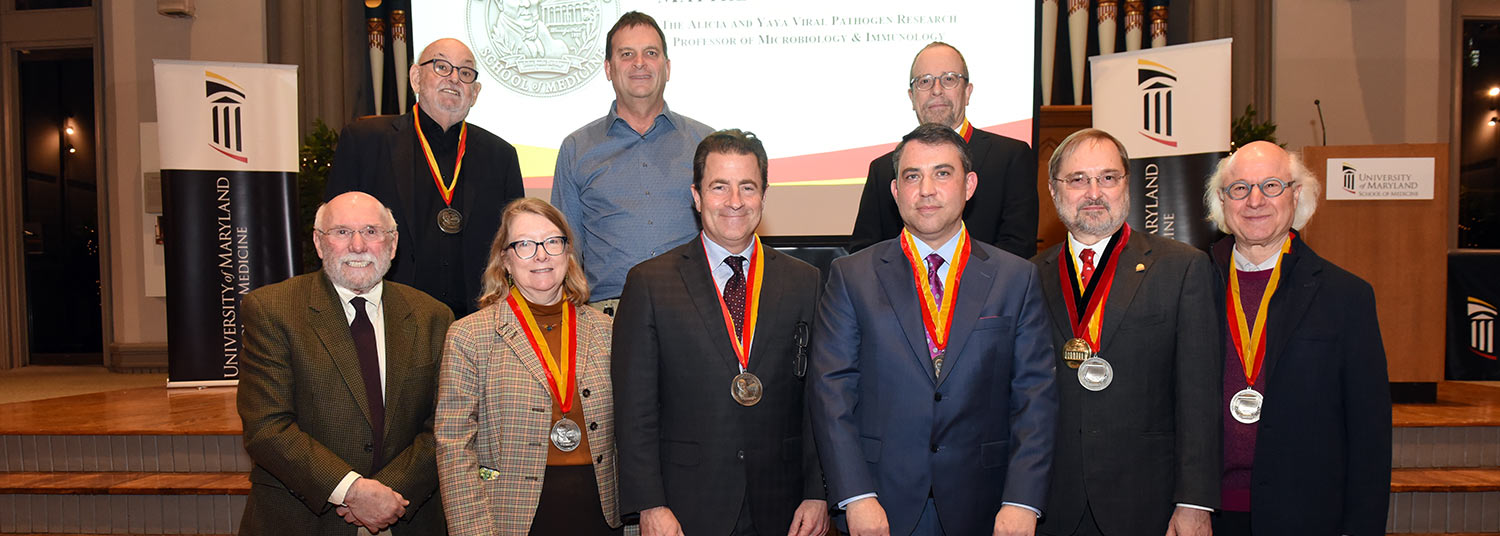May 11, 2023 | David Beaudouin
Investiture Also Celebrates the Generosity of Donors Marco Chacón, PhD and Debbie Chacón
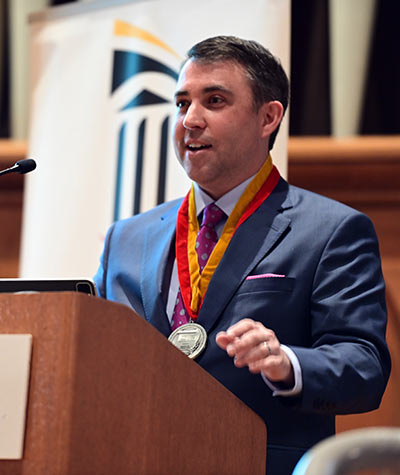 At Westminster Hall on January 31, 2023, in front of a throng of colleagues, family, and other well-wishers, Matthew Frieman, PhD, was invested as the inaugural Alicia and Yaya Viral Pathogen Research Professor in Microbiology & Immunology. This new endowed professorship was established through the generosity of Marco and Debbie Chacón, with matching funds from the Maryland E-Nnovation Initiative Fund (MEIF). Dr. Frieman is a Professor in the Department of Microbiology and Immunology at UMSOM.
At Westminster Hall on January 31, 2023, in front of a throng of colleagues, family, and other well-wishers, Matthew Frieman, PhD, was invested as the inaugural Alicia and Yaya Viral Pathogen Research Professor in Microbiology & Immunology. This new endowed professorship was established through the generosity of Marco and Debbie Chacón, with matching funds from the Maryland E-Nnovation Initiative Fund (MEIF). Dr. Frieman is a Professor in the Department of Microbiology and Immunology at UMSOM.
Dr. Frieman’s research focuses on highly pathogenic coronaviruses, including the Severe Acute Respiratory Syndrome coronavirus (SARS-CoV), the Middle East Respiratory Syndrome coronavirus (MERS-CoV) and now SARS-CoV-2. Throughout his work, he has balanced the study of the biology of these viruses with developing therapeutics against them. His work has been funded by NIH, BARDA, DARPA, The Bill and Melinda Gates Foundation and many industry partners, especially as SARS-CoV-2 emerged. Dr. Frieman’s lab also has collaborated with many researchers and companies, including Regeneron, Novavax, AstraZeneca, Pfizer, and Eli Lilly on SARS-CoV-2 therapeutics.
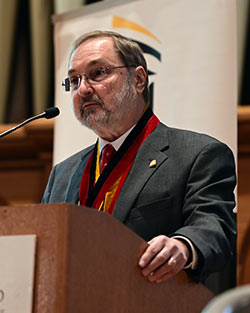 Hosting the event was James B. Kaper, PhD, the James and Carolyn Frenkil Distinguished Dean’s Professor, Vice Dean for Academic Affairs, and Chair of the Department of Microbiology & Immunology. In his introductions, Dr. Kaper acknowledged that Dr. Frieman was one of his first faculty recruits in 2009 after becoming department chair. "Matt has made the most of the opportunities provided to him and has made tremendous contributions to our department and our school in his research, teaching, and service,” he noted.
Hosting the event was James B. Kaper, PhD, the James and Carolyn Frenkil Distinguished Dean’s Professor, Vice Dean for Academic Affairs, and Chair of the Department of Microbiology & Immunology. In his introductions, Dr. Kaper acknowledged that Dr. Frieman was one of his first faculty recruits in 2009 after becoming department chair. "Matt has made the most of the opportunities provided to him and has made tremendous contributions to our department and our school in his research, teaching, and service,” he noted.
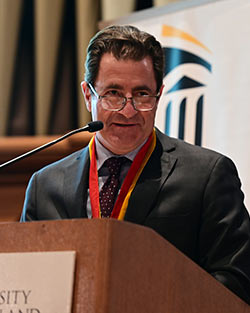 UMSOM Dean Mark T. Gladwin, MD, who also is Vice President for Medical Affairs, UM Baltimore, and the John Z. and Akiko K. Bowers Distinguished Professor, hailed Dr. Frieman as “an original pioneer in the study of pathogenetic coronaviruses like SARS and MERS.”
UMSOM Dean Mark T. Gladwin, MD, who also is Vice President for Medical Affairs, UM Baltimore, and the John Z. and Akiko K. Bowers Distinguished Professor, hailed Dr. Frieman as “an original pioneer in the study of pathogenetic coronaviruses like SARS and MERS.”
Dean Gladwin framed Dr. Frieman’s early research into the Coronaviridae family of RNA viruses as essential to UMSOM’s later response to the COVID-19 pandemic. “In early 2020, as operations at the School of Medicine were shutting down, Dr. Frieman's lab got to work,” he said. “Matt and his associates learned how to grow the new pandemic virus and determined which partners to work with to make potential drugs and therapies for COVID-19, while simultaneously teaching everyone about coronavirus and how to handle it safely in the laboratory. His was one of the first academic labs to receive the SARS-CoV-2 virus from the CDC, and his ongoing work has had a major impact on the development of therapeutics and vaccines for this pathogen.”
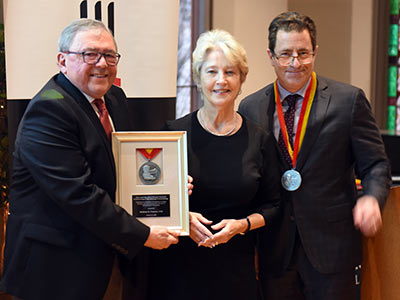 Dr. Frieman’s extraordinary efforts also was noted by local philanthropists Marco and Debbie Chacón. In his remarks, Dr. Chacón said, “Today we come in celebration, united in our tribute to a young scientist for his hard work and dedication in the pursuit of science. It is precisely because of Dr. Frieman’s scholarship in confronting pathogens like COVID-19 that Debbie and I decided to acknowledge his gallant efforts with this professorship”.
Dr. Frieman’s extraordinary efforts also was noted by local philanthropists Marco and Debbie Chacón. In his remarks, Dr. Chacón said, “Today we come in celebration, united in our tribute to a young scientist for his hard work and dedication in the pursuit of science. It is precisely because of Dr. Frieman’s scholarship in confronting pathogens like COVID-19 that Debbie and I decided to acknowledge his gallant efforts with this professorship”.
During his remarks, Dr. Chacón also announced that their Alicia and Yaya Foundation will contribute a matching gift of $500,000 to underwrite the creation of a Center of Excellence in Translational Virology at UMSOM, “dedicated to the development of vaccines, therapeutics, and other countermeasures targeting seasonal, pandemic, and other emergent viral diseases.”
Marco and Debbie Chacón have been valued members of the University of Maryland, Baltimore (UMB) community for many years, generously supporting entrepreneurial, philanthropic, and educational initiatives.
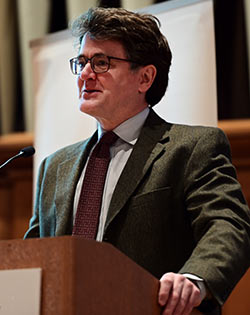 Among those speaking at the ceremony was Brendan Cormack, PhD, a Professor of Molecular Biology and Genetics at the Johns Hopkins University School of Medicine. Dr. Cormack was Dr. Frieman’s PhD advisor at Johns Hopkins. “Matt was always in the lab doing experiments based on all of the questions that sprang from this mind,” he recalled. “He loved experiments and had the unshakeable belief that if you complete a good experiment, you are liable to learn something interesting. That scientific optimism is what brings us here today.”
Among those speaking at the ceremony was Brendan Cormack, PhD, a Professor of Molecular Biology and Genetics at the Johns Hopkins University School of Medicine. Dr. Cormack was Dr. Frieman’s PhD advisor at Johns Hopkins. “Matt was always in the lab doing experiments based on all of the questions that sprang from this mind,” he recalled. “He loved experiments and had the unshakeable belief that if you complete a good experiment, you are liable to learn something interesting. That scientific optimism is what brings us here today.”
In taking the podium, Dr. Frieman thanked all present for their support, including the Chacóns. “Thank you to the Chacóns for your generosity and this wonderful professorship,” he said. “I hope that someday, I can provide an honor like this to someone else and pay it forward.”
Contact
David Beaudouin, MA, MA
Managing Editor, Content Strategy
Office of Public Affairs and Communications
University of Maryland School of Medicine
655 W. Baltimore Street
Bressler Building, 14th Floor, Rm 14-002
Baltimore, Maryland 21201
410-706-4348
410-706-8520 (fax)
DBeaudouin@som.umaryland.edu

